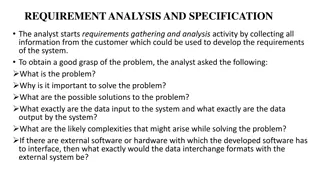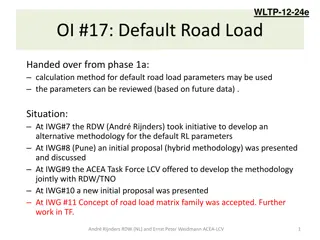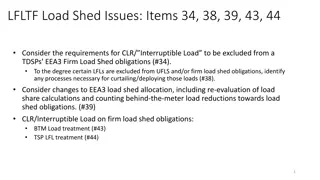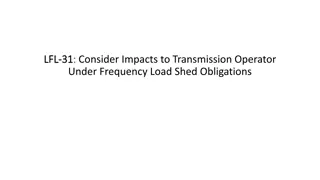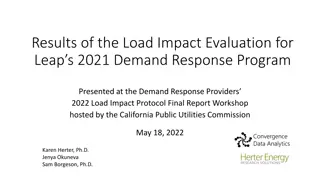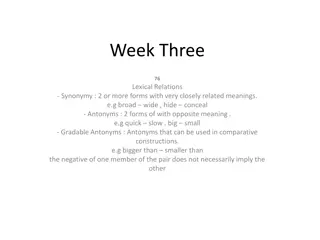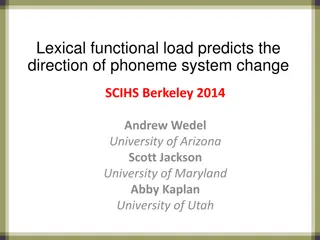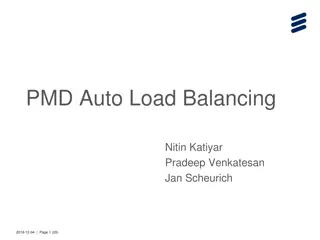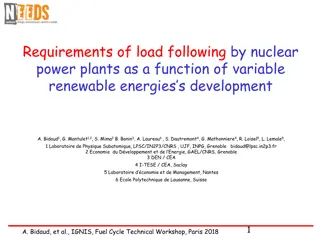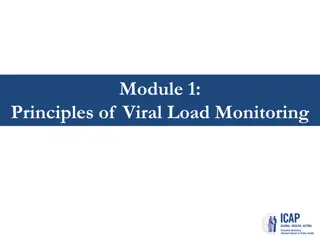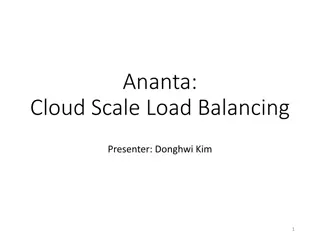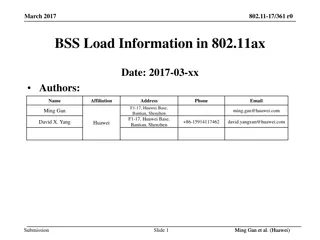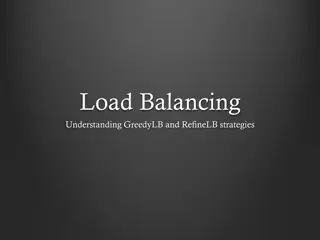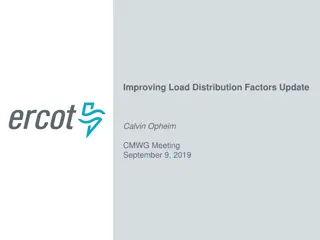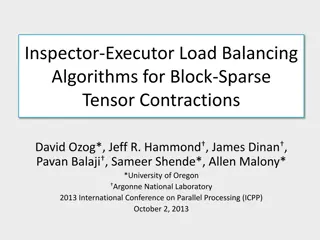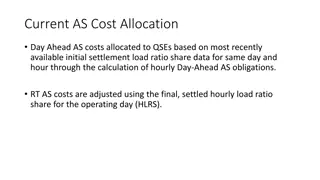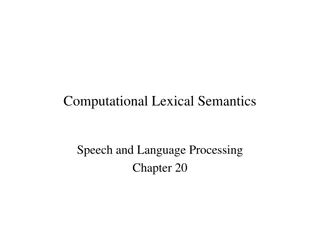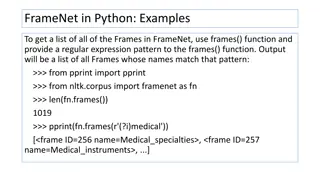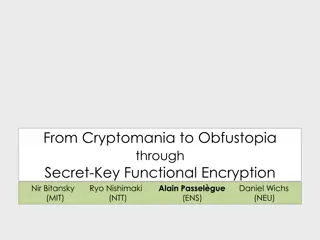Cognitive Load Classification with 2D-CNN Model in Mental Arithmetic Task
Cognitive load is crucial in assessing mental effort in tasks. This paper discusses using EEG signals and a 2D-CNN model to classify cognitive load during mental arithmetic tasks, aiming to optimize performance. EEG signals help evaluate mental workload, although they can be sensitive to noise. The
0 views • 19 slides
Electrical Distribution Concept and Layout at FCC Week
Presentation at FCC Week 2022 focused on load requirements, high voltage network scheme, downstream electrical distribution for various points, and a preliminary load flow analysis. The update on load requirements includes P sizing, updates on RF systems, preliminary load surveys, and separation of
0 views • 15 slides
BRIDGE LOADING AND RATING.
Bridges are subjected to various loads including dead load, live load, and other loads such as wind and temperature effects. The classification and characteristics of each load type are discussed. Additionally, the process of rating bridges to determine their load carrying capacity is explained. The
1 views • 21 slides
Understanding How to Read a Load Chart for a 100-ton Crane
Load charts are essential for determining safe lifting capacities of cranes in construction and heavy machinery operations. This guide explains how to interpret load charts based on factors like boom length, operating radius, and load weight, ensuring safe and efficient crane operations. Learn to id
5 views • 7 slides
Uptake of Viral Load Testing and Viraemic Episodes During Pregnancy in Johannesburg, South Africa
This study investigates the uptake of viral load testing and frequency of viraemic episodes during pregnancy among HIV-positive mothers in Johannesburg, South Africa. Data from a cohort of mothers and infants born at a local hospital were linked to laboratory data for analysis. The results show the
2 views • 12 slides
Software Requirement Analysis and Documentation Process
The requirement analysis and specification process involves gathering information from customers, identifying the problem, solutions, data requirements, complexities, and potential interfaces. Key components of a Software Requirements Specification (SRS) document include functional requirements, non
0 views • 23 slides
Understanding Predicators and Predicates in Sentence Semantics
Exploring the semantics of sentences, this content delves into the structure of declarative sentences in terms of predicators and arguments. It discusses various classes of items that can function as the predicator of a sentence, such as lexical verbs, the copulative verb "be" in equative sentences,
1 views • 39 slides
Understanding Bridge Loading and Rating
Bridges are subjected to various types of loads such as dead load, live load, and other loads like wind and temperature effects. Dead load consists of the bridge's self-weight, while live load includes temporary moving loads. Bridges are rated to determine their load carrying capacity, especially in
0 views • 21 slides
- Development of Alternative Methodology for Default Road Load Parameters in Vehicle Testing
- The initiative to develop an alternative methodology for default road load parameters in vehicle testing was led by RDW and ACEA. The process involved multiple meetings, discussions, and proposals, resulting in the acceptance of the concept of a road load matrix family. Various x-factors were adop
2 views • 22 slides
Critical Load Status of Water and Sewer Facilities - Filing Requirements and Impacts
Water and wastewater utilities in Texas are required to provide critical load status information to various entities by November 1, 2021. The Senate Bill 3 of the 87th Legislature outlines the filing requirements and impacts on electric utilities and Retail Electric Providers (REPs). The process inv
2 views • 4 slides
Understanding LFLTF Load Shed Issues and Allocation Process
Explore the complexities of excluding CLR/Interruptible Load from a TDSP's EEA3 Firm Load Shed obligations and the necessary processes for managing load curtailment. Learn about the load shed allocation process, foundational assumptions, and a problem scenario involving load consumption during peak
1 views • 9 slides
Understanding Lexical Density in Text Analysis
Explore the concept of lexical density by analyzing the proportion of content words in a text. Learn how lexical density impacts clarity and interpretation using examples with varying levels of lexical density. Gain insights into the significance of lexical words and how they contribute to the meani
4 views • 34 slides
Understanding Transmission Operator Obligations in Under-Frequency Load Shedding
ERCOT Compliance ensures that Transmission System Operators (TSOs) and Distribution System Operators (DSOs) have automatic under-frequency load shedding circuits in place to provide load relief during under-frequency events. The TSOs are required to shed a specific percentage of their connected load
0 views • 6 slides
Roadmap for DNS Load Balancing Service at CERN - HEPiX Autumn 2020 Workshop
This roadmap presented by Kristian Kouros on behalf of the DNS Load Balancing Team at CERN outlines the introduction, implementation, and upgrades associated with the DNS Load Balancing Service. It covers topics such as system architecture, LBClient metrics, and the overall structure of the service.
3 views • 29 slides
Load Impact Evaluation for Leap's 2021 Demand Response Program
Results of the Load Impact Evaluation for Leap's 2021 Demand Response Program were presented at the Demand Response Providers 2022 Load Impact Protocol Final Report Workshop hosted by the California Public Utilities Commission. The evaluation analyzed the number of meters and events, enrollment deta
2 views • 10 slides
Understanding Lexical Relations in Linguistics
Different types of lexical relations such as synonymy, antonyms, hyponymy, homophony, and homonymy play a crucial role in understanding the nuances of language. Synonyms have closely related meanings, antonyms have opposite meanings, while hyponymy and hypernymy show hierarchical relationships betwe
0 views • 4 slides
Understanding Word Meaning in Lexical Semantics
Introduction to Chapter 5 Lecture 4.1 discusses the nature of word meaning, major problems of lexical semantics, and different approaches. It explains the concept of a word, prototypical words, lexical roots, lexemes, and word forms, highlighting the importance of the word as a lexeme in lexical sem
0 views • 20 slides
The Influence of Lexical Functional Load on Phoneme System Changes
The study explores how the functional load of phoneme contrasts affects the trajectory of phoneme system changes over time. Researchers examine phoneme mergers in nine languages, finding an inverse correlation between the number of minimal pairs and mergers. The model is refined to investigate diffe
2 views • 26 slides
Building interactive interpreter for Calculator Language with REPL, Parsing, and Lexical Analysis
This project involves creating a user interface similar to a Read-Eval-Print Loop (REPL) for programming languages. Users can input text representations of expressions, which are then parsed, evaluated, and errors are handled accordingly before displaying the expression's value. Additionally, the st
0 views • 22 slides
Automatic Load Balancing Proposal for PMD Port Queue Assignment
This proposal discusses dynamic port queue assignment strategies for PMDs in network environments. It covers both static and dynamic assignment methods, such as round-robin and cycles-based algorithms, to ensure uniform load distribution. The proposal introduces an automatic load balancing feature,
0 views • 20 slides
Load Following by Nuclear Power Plants in Relation to Variable Renewable Energies' Development
The study explores the requirements of load following by nuclear power plants in the context of variable renewable energies' growth. It discusses the impact of renewable energy development on nuclear economic models and the need for dispatchable capacities. Benchmarks are set to test robustness of d
0 views • 11 slides
Zimbabwe HIV Viral Load Testing Overview
Zimbabwe's plan to scale up HIV viral load testing from 2018 to 2020 is outlined, with targets set for each year. The country has made significant progress in expanding its viral load testing capacity, going from targeted testing to near-universal coverage by 2018. Various testing laboratories in Zi
0 views • 9 slides
SN65HVD33 Load Tests Aug. 2018
Conducted load tests on SN65HVD33 device with specific test conditions including Vcc=3.3V, termination of 120 Ohm, PRBS data at 26Mbps, CAT5 cable of 1 foot length, and load of 200 Ohm. Analyzed Vpp of A-B and Rout under different load conditions. Detailed results and analysis presented in images.
0 views • 4 slides
Principles of Viral Load Monitoring in HIV Infection
Understanding viral load dynamics in HIV infection is crucial for managing treatment and transmission risks. Viral load monitoring helps assess response to antiretroviral therapy and identify treatment failure. Regular viral load testing is recommended for both adults and children on ART, allowing f
0 views • 40 slides
Understanding Page Load Performance Optimization
Optimizing page load performance is crucial for enhancing user experience and increasing revenue. This article delves into the complexities of page load times, identifies common bottlenecks, and explores optimization techniques. Examples and insights from research conducted by WProf shed light on th
0 views • 55 slides
Fault-tolerant and Load-balanced VuFind Project Overview
Project Background: Part of the National Digital Library initiative, the VuFind project aims to provide a discovery interface for Finnish archives, libraries, and museums. It started development in 2012 due to the insufficiency of existing commercial products. The focus is on enhancing fault toleran
1 views • 19 slides
Dynamic Load Balancing on Graphics Processors: A Detailed Study
In this comprehensive study by Daniel Cederman and Philippas Tsigas from Chalmers University of Technology, the focus is on dynamic load balancing on graphics processors. The research delves into the motivation, methods, experimental evaluations, and conclusions related to this critical area. It cov
0 views • 57 slides
Cloud Load Balancing Overview and Requirements
This content provides a detailed overview of cloud-scale load balancing, involving components like servers, hypervisors, VMs, VIPs, DIPs, and the role of load balancers in distributing workloads efficiently. It also discusses communication flows involving VIPs, DIPs, front-end VMs, back-end VMs, and
0 views • 35 slides
Enhancing BSS Load Management in 802.11ax Networks
Proposed changes to address load balancing issues in dense 802.11ax scenarios by introducing a new information element for BSS Load. The new element considers OFDMA utilization, UL/DL MU-MIMO, and allows for future extensions to ensure efficient AP selection by unassociated STAs. Enhancements aim to
0 views • 14 slides
Understanding GreedyLB and RefineLB Load Balancing Strategies
Explore the GreedyLB and RefineLB load balancing algorithms, their implementation steps, utilization before and after load balancing, object migration statistics, and cost considerations. Learn how the strategies optimize the mapping of objects to processors for efficient load balancing.
1 views • 21 slides
Enhancing Load Distribution Factors for Improved Accuracy
Explore techniques to enhance load distribution factors for better accuracy, considering weather forecasts that can change daily. Tasks include utilizing Mid-Term Load Forecast models, improving error correction settings, and implementing a neural network model. The aim is to increase forecast accur
0 views • 19 slides
Dynamic Load Balancing in Block-Sparse Tensor Contractions
This paper discusses load balancing algorithms for block-sparse tensor contractions, focusing on dynamic load balancing challenges and implementation strategies. It explores the use of Global Arrays (GA), performance experiments, Inspector/Executor design, and dynamic buckets implementation to optim
1 views • 32 slides
Understanding Lexical Semantics: An Overview
Lexical semantics explores the relationships words have with each other and with our understanding of reality. It delves into reference and sense, naming theory, synonymy, and more. Reference focuses on how words relate to objects, while sense deals with relationships between lexical items. Naming t
0 views • 10 slides
Cost Allocation Strategies for Ancillary Services in Electricity Markets
Cost allocation for Ancillary Services (AS) in the electricity market involves distributing costs to Qualified Scheduling Entities (QSEs) based on load ratio share data. Two options are presented: one calculates separate hourly Real-Time Co-optimized Load (RCL) and Non-RCL Load Ratio Share (LRS) for
0 views • 5 slides
Octavia Project Overview and Updates
Octavia is a network load balancing service in OpenStack that provides scalable, on-demand, and self-service access to load balancer services. The project has evolved to encompass all network load balancing and offers key features such as flexible network topologies, highly available load balancers,
0 views • 11 slides
Understanding Word Sense Disambiguation in Computational Lexical Semantics
Explore the intricate world of word sense disambiguation in computational lexical semantics, covering supervised and unsupervised techniques, lexical sample and all-words tasks, and various approaches such as knowledge-based and machine learning. Delve into the complexities of interpreting different
0 views • 94 slides
Working with FrameNet in Python
Examples provided demonstrate how to access FrameNet data in Python using functions like frames(), frame(), lus(), and lu(). You can search for specific frames, get details of individual frames, lexical units, and roles in FrameNet. The content showcases how to retrieve information on medical frames
0 views • 12 slides
Understanding Lexical Relations in Language
Lexical relations play a crucial role in understanding the meanings of words in any language. They encompass relationships like entailment, paraphrase, and contradiction, shedding light on how lexemes are interconnected. Additionally, lexical fields and kinship systems offer further insights into ho
0 views • 10 slides
Functional and Lexical Distribution of Indo-European Verbs
Investigating the functional and lexical distribution of Indo-European verb classes, this research delves into the mi- and xa-conjugations in Proto-Indo-European, new discoveries in the preterit of the xa-conjugation, paradigms in Hittite, perfect and middle endings in Late Indo-European, and the ch
0 views • 18 slides
Advances in Functional Encryption for Secure Data Handling
Explore the evolution from Cryptomania to Obfustopia through Secret-Key Functional Encryption, Public-Key Encryption, and the power of Secret-Key Functional Encryption. Discover the significance of different encryption schemes such as Public-Key Functional Encryption, Secret-Key Functional Encryptio
0 views • 36 slides





